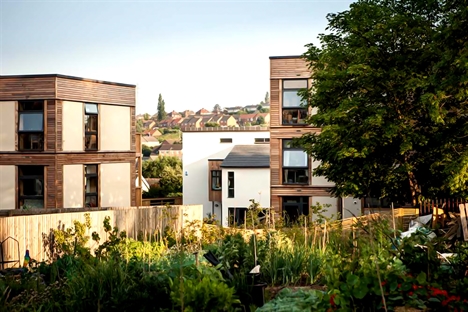28.10.16
Scaling out, not up
Source: PSE Oct/Nov 16
Community-led developments should not be overlooked in helping tackle the country’s housing crisis, argues Tony Armstrong, chief executive of Locality.
Scale isn’t necessarily the answer when it comes to solving the housing crisis. It certainly isn’t the whole answer.
There’s no denying that, as a country, we need more homes, and the temptation to think big to solve this gargantuan problem has seduced successive governments.
But bigger isn’t necessarily better and the potential of small-scale community-led housing developments to have a positive impact on the crisis should not be overlooked.
Local communities across the UK are leading the way to more affordable housing by setting up and managing their own housing developments. Their projects tackle the housing crisis head-on, offering local people access to new and refurbished rented affordable housing, and controlling properties in the long term so that they are not sold off or snapped up by buy-to-let landlords.

The small is beautiful principle
We’ve seen initiative after initiative to encourage more large-scale housing development but these only seem to have limited impact, with developers accused of land banking and local authorities reluctant to approve large new developments.
It’s time we turned to the ‘small is beautiful’ principle – smaller, community-based development, but much more of it, is an important but so far overlooked part of the solution.
Community-led housing has the potential to empower communities and to deliver housing projects that people care about, which meet local needs, maximise financial and social benefits, and can support the wider regeneration of an area. It can provide jobs and opportunities for local people and boost the local economy. It is a genuinely achievable option for many neighbourhoods and should be promoted as a mainstream option in housing development.
Community Buildings Fund
At Locality, we’ve long seen community-led housing as an important part of the solution to addressing increasing housing need, and the government is keen to see more of it too, offering support and funding through the Community Buildings fund (part of the Neighbourhood Planning programme which we run on behalf of the DCLG).
This covers the costs that groups incur in getting to the point of applying for planning permission or submitting a community right to build order – but left a gap in funding and support for groups at the very early stages of the process.
To address this shortfall, we’ve now opened a programme, funded by the Nationwide Foundation, to support 22 very early stage groups who do not yet qualify for the government funding.
We are providing one-to-one support and a small grant to help groups get their community-led housing idea off the ground, getting them to the position where they can go on to access government funding or other streams of support and finance.
Through the new Early Stage Support programme, we want to show that communities building their own housing is a viable, mainstream option to help beat the housing crisis and provide much-needed quality, affordable housing for neighbourhoods in need.
Innovative neighbourhood approaches
There are already some fantastic examples of organisations using truly innovative approaches to tackle the problem of housing in their neighbourhoods.
Locality member Goodwin Development Trust has broken new ground by building modular family homes on a council estate in Hull. The smart-looking three-bedroomed houses are a far cry from the 1960s pre-fabs we know and loathe; they took just three days to install and are so energy-efficient they have practically no running costs.
In North Yorkshire, Hudswell Community Charity is taking a more traditional approach, providing affordable cottages for young people with a connection to the village but who can’t afford the £350,000 average price tag for a home.
But the benefits of community-led housing reach beyond simply putting roofs over people’s heads; projects provide a boost to the local economy as groups choose local construction firms and other professionals to help them progress their project.
Canopy Housing in Leeds runs a self-help project which sees young homeless people
renovate derelict houses to create their own decent homes. Canopy brings together volunteers from the local community to learn skills, increase confidence, break down barriers, make big improvements to local neighbourhoods and provide much-needed housing.
Community-led housing is largely overlooked as a solution to the crisis but people are taking the matter into their own hands, showing that it could be a mainstream option to provide much-needed affordable housing across the country.
If, say, 200 community organisations branch out into housing, building or redeveloping 30 or so homes each, it could begin to make a big dent in the housing shortage problem. Small-scale community-led housing projects around the country can all add up to become an important part of the solution to the crisis.
FOR MORE INFORMATION
W: www.locality.org.uk
Tell us what you think – have your say below or email [email protected]